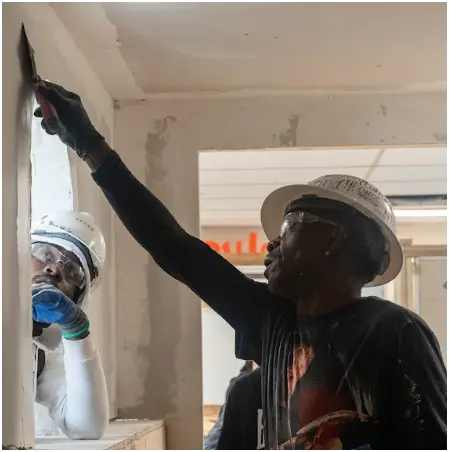Last Updated on November 19, 2025 by admin
Avoid college loans. Pick up real earnings early. A Drywall and framing program provides skills, pays well, and speeds up the process. Students in one Drywall and framing program hit their income goals faster than many in white-collar jobs.
Here’s what’s happening in drywall right now:
| What’s Happening | Real Numbers | Why That Matters |
| People are already in the drywall field | Over 103,100 workers | Shows the size and security of this field |
| Average earnings | About $27.95 per hour | That’s more than $58,140 each year |
| Top pros make | $36 per hour or more | Enough to break six figures yearly |
| US construction market size | $3.7 trillion in 2025 | Growing at 4.1% annually since 2020 |
| Repair market growth | Doubling by 2033 | Repairs and finishing create endless repetitive work |
These numbers aren’t just figures. They show why trained installers build stability, freedom, and substantial, long-term incomes.
Construction keeps expanding. Drywall installers, tapers, and ceiling tile workers are projected to experience steady growth from 2024 through 2034. Side hustlers who choose training won’t be left behind.
A trained Drywall technician earns far more than casual gig workers. Professional quality brings repeat contracts. That means drywall repair jobs become steady income streams, not just weekend side gigs.
Here’s what income looks like at different career stages, according to the U.S. Bureau of Labor Statistics:
$49.67/hour and more (over $103,310 annually)
Median wages for drywall installers grew 11% recently, one of the largest increases among all construction occupations. With passing time and increasing experience, a six-figure annual income is easily attainable in drywall and framing jobs.

Structured training gives you credibility. Contractors and clients want proven skills.
At PTTI, we see it firsthand. Our Drywall and Framing program graduates receive 30–50% more job offers immediately after completing the course.
Philadelphia’s construction scene is intense. Renovations and new builds keep increasing. Local clients consistently require installation services in Philadelphia.
We prepare students for Drywall taping, finishing, framing, and repair. We also connect them with apprenticeships and jobs. Many become top Drywall technician contractors right here.
The drywall repair market is expected to double in size worldwide within the next decade. That means cracks, holes, water damage, and texture finishing all bring constant work.
Mastering Drywall taping matters, too. Homeowners and businesses pay more for flawless work.
Here’s what income looks like at different career stages:
With passing time and increasing experience, a six-figure annual income is easily attainable in drywall and framing jobs.
Most drywall and framing programs cost significantly less than a four-year college degree program. Training often lasts months instead of years.
You start earning faster. You avoid $20,000–$60,000 or more in student loans. Plus, you gain early industry exposure through apprenticeships or part-time work.

Success in drywall doesn’t rely only on skills. Relationships also make a significant difference. Contractors prefer hiring reliable workers who finish projects well and on time. When you train, you enter that trusted circle sooner.
Clients also spread the word. A homeowner impressed with your Drywall taping and finishing will tell others. That personal recommendation is powerful. It builds steady demand for drywall repair jobs or even bigger contracts. For those offering Installation services in Philly, word-of-mouth can replace costly advertising.
Networking, reliability, and skill, together, create a career path that is much stronger than gig-based work.
Today’s industry is changing fast. Tools are lighter, safer, and more precise. Digital measurement systems cut down mistakes. Finishing tools improve Drywall taping speed.
Learning these in a Drywall and framing course prepares you to stand out. Skilled workers who utilize technology effectively complete projects faster, saving money for their clients. That means more referrals and higher pay.
Choosing drywall as a career gives more than income. It also delivers the freedom many office jobs can’t provide. Skilled tradespeople often manage their own hours. They also choose projects that excite them. That means more control over work-life balance.
For example, a trained Drywall technician can pick up drywall repair jobs during weekdays and focus on family weekends. Larger contracts, such as Installation services in Philly, allow pros to build substantial savings quickly. Many workers enjoy flexibility, steady pay, and creative satisfaction. Unlike office work, no two projects look the same.
With every project, skills grow. Confidence builds. So does financial stability. That freedom, paired with security, makes drywall careers especially rewarding.
Drywall work doesn’t stop at taping and framing. With time, skilled pros often expand into project management, custom design, or even owning a business. Completing a Drywall and framing course is just the start of this pathway.
Many graduates later launch their own companies offering Installation services in Philly or beyond. Some become trainers, teaching future workers the art of Drywall taping and repairs.
The possibilities are vast. And since the industry is projected to keep growing at 4% through 2034, the opportunities only expand. For those serious about moving past side hustles, career growth potential is both real and reachable.
A Drywall and framing course gives you tools, speed, and confidence. Statistics confirm a rising and steady demand in the industry. The pay is increasing too, and the markets are expanding constantly.
Working hard, you build a reputation for being a skilled Drywall technician in your area. You deliver clean Drywall taping, master drywall repair jobs, and offer professional Installation services in Philly.
Train well. Work smart. You’ll secure confidence, income, and long-term success without college debt holding you back.
Read More-